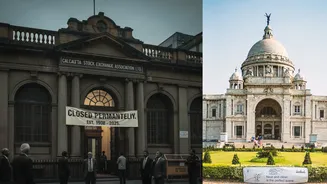Kolkata’s Calcutta Stock Exchange (CSE) — one of India’s oldest and most storied bourses — appears to be nearing the end of its historic journey. According
to a report by NDTV Profit, the exchange is preparing to voluntarily wind up operations, bringing to a close more than a century-long legacy in India’s financial markets. A Historic Institution Nears Its Final Chapter Founded in 1908, the Calcutta Stock Exchange has been a key pillar of India’s capital markets for decades. At its peak, it hosted hundreds of brokers and companies, playing a vital role in the trading ecosystem of eastern India. However, over the past two decades, the CSE struggled to maintain relevance amid the rapid modernization of the Bombay Stock Exchange (BSE) and National Stock Exchange (NSE). Regulatory and Legal Challenges As NDTV Profit reported, the decision to move toward a voluntary exit comes after years of regulatory hurdles and legal battles. The Securities and Exchange Board of India (SEBI) had earlier called for regional exchanges to either meet strict net-worth and turnover requirements or exit the business altogether. CSE attempted several revival measures, including modernization plans and technology partnerships, but failed to restart active trading. The exchange has not seen meaningful trading activity since 2013, when SEBI ordered it to halt operations due to non-compliance with updated norms. The voluntary exit plan means CSE will begin the process of returning capital to shareholders, settling obligations, and relinquishing its exchange license. For many of Kolkata’s veteran brokers, the closure marks the end of an era that began in the colonial period and continued through India’s economic liberalization. If approved, this move could formally bring down the curtains on a 117-year-old institution that once stood as a symbol of Bengal’s entrepreneurial spirit. A Symbol of the Past While India’s financial hubs have shifted decisively to Mumbai and, increasingly, to digital trading platforms, the Calcutta Stock Exchange building on Lyons Range remains a nostalgic landmark for many in the city. Its closing would mark the final transition from the age of open-outcry trading floors to the era of high-frequency and algorithmic trading that now dominates global markets.






















